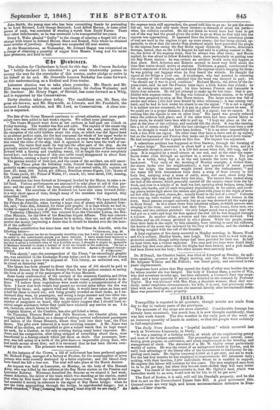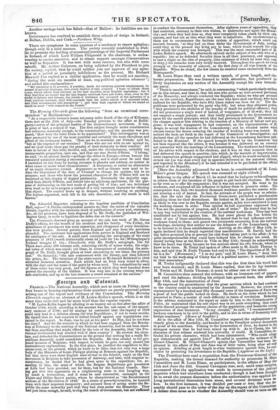IRELAND.
Tranquillity is reported in all quarters; though arrests are made from day to day in various parts of the provinces. The accounts of the crops are more cheerful. Considerable damage has already been sustained; but much less, it is now thought confidently, than was last week feared. The fine weather in the early part of the week set an immense quantity of hands in motion; so that the people were suddenly in full employment.
The Daily News describes a "hopeful incident" which occurred last week at Newtown-Limavady, in Derry.
"It was a meeting of a farming society, at which all the neighbouring gentry and most of the farmers assembled. The proceedings had much interest, mani- festing great progress in cultivation, and much improvement in the breeding and management of stock. The statement of a Mr. W. Ogilvy seems particularly worthy of notice. He was the owner of an unimproved estate in Tyrone, and he early took advantage of the liberal offer of the Government to lend money for im- proving such lands. Mr. Ogilvy borrowed 6,0001. at 3 per cent, and set to work. For the last four months he has employed in improvements 400 labourers daily; making, with their families, 2,400 Individuals whom he is enabled to support. He expects this labour will continue for five years. The men employed earn from is. to a 6c1. per day; but when they become more skilled they will earn better wages. The result of the improvements is, that Mr. Ogilvy's laud, which was heretofore worth Is. an acre, would now let for 15s. to 11. 18. per acre." The Earl of Roden, it is said, will sell his Dundalk property, and be the first to act on the Encumbered Estate Sale BilL A good movement this. Ground-rents are very high and house accommodation defective in Dun- dalk.—Ukter Gazette.
Another savings-bank has failed—that of Mallow: its liabilities are un- known.
Government has resolved to establish three schools of design in Ireland;
at Belfast, Dublin, and Cork.—Northern Whig.
There are symptoms in some quarters of a tendency to renew agitation; though only in a mild manner. The society recently established in Dub- lin to promote the holding of occasional:meetings of the Imperial Parliament in Ireland, of which Lord William Fitzgerald is the chairman, is endea- vouring to excite attention, and to obtain support amongst Conservatives U well as Repealer& It has met with some success, but also with some rebuffs. Mr. Arthur Guinness, on being solicited by the President to join the society, replied, that he could neither join nor approve of any agita- tion' at a period so peculiarly infelicitous as the present. Mr. Richard Maxwell Fox replied to a similar application, that he would not sanction, "during the next six months at least, any political agitation whatever"; and added this explanation- " Sly intention is to procure, if possible, Jim& for carrying general employment, by means of arterial drainage, into every district of this country. I hope to obtain these loans, which afford high interest on the best security, from English capitalists : but if they find that no sooner has the late frantic outbreak been put down, than, even in the midst of famine and disease, the minds of Irishmen are occupied in the agitation of • fresh political nostrum, they will conclude that the entire nation is of unsound mind, and Irish Investments still precarious "; and thus that capital of which we stand so =eh in need "will remain in the Funds."
The Morning Chronicle gives the following "from an occasional corre- spondent" at lelnllinahone- " At a respectable farmer's house not many miles South of the city of Kilkenny, there met on the 25th of July—the Tuesday previous to the affair at Bailin- garry—seven of the principal leaders of the insurrectionary movement It was, in point of fact, a council of war. The first subject brought under consideration Lad reference, naturally enough, to the commissariat; and the question was pro- posed, How were the rebel forces to be maintained?' This interrogatory was at once answered by one of the most youthful and certainly the most chivalrous and gifted of the insurgent leaders. How are we to maintain our friends,' said he, but at the expense of our enemies? Those who are not with us are against us, and we shall make them pay the penalty of their disloyalty to their country.' All were in favour of this bold, decided, and, under the circumstances, certainly not unreasonable proposition, save one, and that one was Smith O'Brien. 'I belong,' he said, to an ancient family—perhaps the oldest in Europe—whose honour has remained untainted during a succession of ages; and it shall never be said that I tarnished its fair fame by having recourse to plunder and robbery, no matter in what cause or under what circumstances.' A discussion, or rather an altercation of an angry character, ensued. Arguments as well as threats were used to in- duce the descendant of the hero of Clontarf to change his opinion; but to no purpose; and those who know the personal character of Mr. 013rien will not be surprised at this display of dogged pertinacity. Eventually the majority sepa rated from Smith O'Brien, and retired into an adjoining apartment, for the pur- pose of deliberating on the best mode of getting rid of him; and one individual even went so far as to propose a method of a very summary character for effecting that object. The council broke up in despair, without resolving on anything. The leaders separated, each left to his own discretion; and the result is well known."
The Limerick Reporter, referring to the hopeless condition of Conciliation Hall, says—" A Dublin correspondent assures us, that the entire of the valuable library, together with the extensive stock of publications of every sort, stationery, &a, on the premises, have been disposed of to Mr. Duffy, the publisher of Wel- lington Quay, in order to liquidate the debts due on the concern."
The Freeman's Journal gives an account of the sale last week of Mr. Gavan Duff's effects, for the benefit of his creditors and his family. "On Friday, the attendance of purchasers was most numerous, and clergymen of every denomina- tion were present. Several persons from England and also from the provinces attended. The auctioneer had applications from parties in England and Scotland for catalogues of the sale. A small card containing the autographs of the state prisoners of 1843 (worth intrinsically about 4d.) sold for 14s. 6.1.; IrGeoghegan's Ireland brought 1/. us.: Chuzzlemit, with Mr. Duff's autograph, 13a. 6d. There were about 400 volumes sold, consisting chiefly of minor works, the origi- nal value of which was small; yet these, in consequence of containing the auto- graph of Mr. Duffy, brought prices at least amounting to ten times the primary cost." On Saturday, "the sale commenced with the library, and then followed the prints, &c. The furniture of the state-rooms at Richmond Bridewell in 1844 attracted immense attention. Each article had an Irish harp inlaid in silver, with the date and the name of the party by whom used. The competition for each of these relics was very great, and the figures at which they were knocked down proved the sincerity of the bidders. It was very late in the evening when the sale concluded, and up to the last moment a crowd remained at the auction."



























 Previous page
Previous page